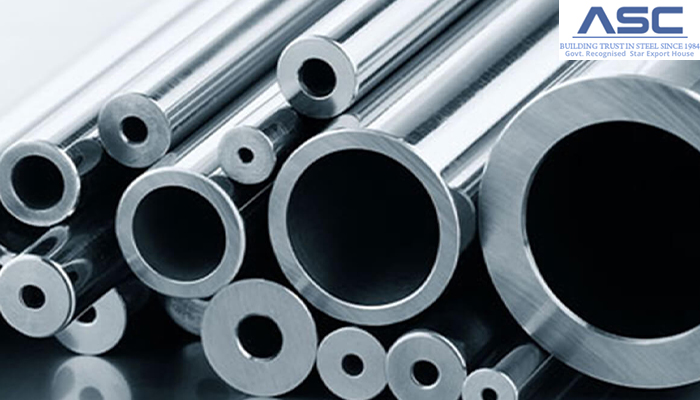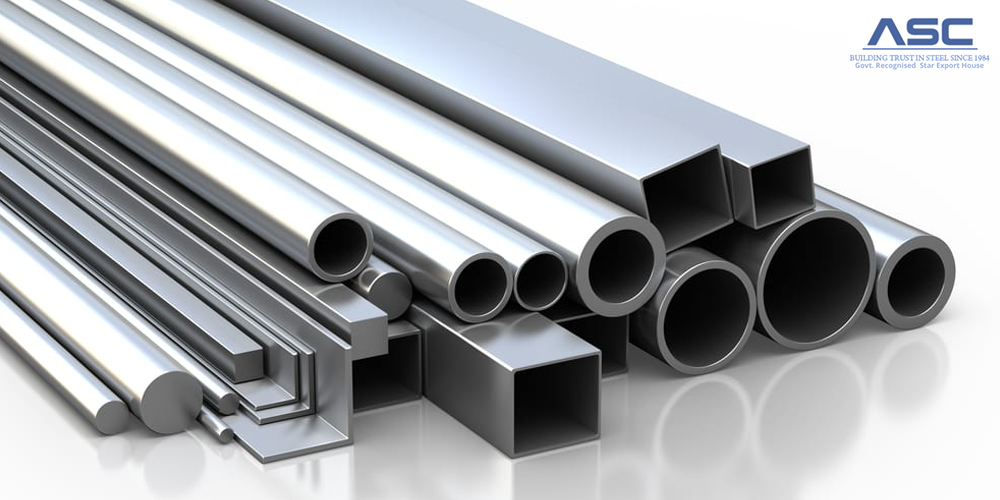Alloy Steel Grades & Specifications
by AMC
Posted on February 27, 2023 at 12:40 PM

What is Alloy Steel?
Alloy steel is one of the most versatile steels available in the world. With a wide range of
elemental properties and specifications, it is the superior choice for mission-critical applications
that demand superior performance under high pressure environments. From oil and gas exploration to
aerospace and defense, alloy steel is a key component in many exotic and demanding applications.
Alloy steel is the perfect
combination of strength and versatility. It is made by combining carbon
steel with one or several alloying elements, such as manganese, silicon, nickel, titanium, copper,
chromium, and aluminum. These metals are added to produce specific properties that are not found in
regular carbon steel. The elements are added in varying proportions or combinations, making the
material take on different aspects such as increased hardness, corrosion resistance, strength,
improved formability (ductility), and the weldability can also change.
Top Alloy Steel Grades for Industrial Use
Alloy steel grades are used to classify different types of alloy steels based on their composition and strength. Alloy steel grades help identify the right type of steel for specific uses in various industries. Each grade has unique qualities that make it suitable for certain applications. Here are some commonly used alloy steel grades and their key features:
- Alloy Steel 300M: This is a very strong steel made using a special vacuum process. It is tough, resists fatigue (wear over time), and is flexible, making it perfect for use in aerospace parts.
- Alloy Steel 4130: Known for its strength, toughness, and ability to be welded, 4130 is commonly used in making parts for cars and airplanes.
- Alloy Steel 4140: This grade is strong and easy to machine, making it ideal for creating gears, shafts, and other parts that need to withstand a lot of stress.
- Alloy Steel 4340: This steel is strong, tough, and resistant to wear and tear. It is often used in heavy-duty parts like crankshafts and airplane landing gear.
- Alloy Steel 6150: With added chromium and vanadium, this steel is very tough and resists wear. It is commonly used in making springs and other high-strength components.
- Alloy Steel 8620: This steel is known for its ability to be hardened and is often used in parts like gears and crankshafts that need to have a strong and durable surface.
Each alloy steel grade is designed for specific purposes, making it easier for industries to choose the best steel for their needs. Whether it’s for building strong aerospace parts or creating durable machine components, alloy steel materials are widely used because of their reliability and versatility.
Get the Best Alloy Steel Grades for Your Project
Each alloy steel grade is made to meet specific needs, from high strength to excellent machinability. Let us help you select the perfect alloy steel material for your requirements.
The most important and desired changes in alloy steel are:
Increased hardenability is achieved by adding alloying elements like manganese, nickel, and
chromium. This property is important for applications that require increased strength and
durability, such as manufacturing heavy machinery and equipment. It is also crucial in applications
where the material will be subjected to high levels of stress or wear and tear, such as oil and gas
drilling equipment.
Increased corrosion resistance is achieved by adding alloying elements like copper, silicon, and
aluminum. This property is important for applications that will be exposed to corrosive
environments, such as offshore oil rigs, chemical processing plants, and marine equipment. The added
elements create a protective barrier that prevents the material from corroding and degrading over
time.
Another important property of alloy steel is its ability to retain its hardness and strength under
high pressure environments. This property is crucial in mission-critical applications where failure
is not an option. Alloy steel is the go-to choice for applications that demand superior performance
under high pressure and high-stress environments.
Alloy Steel - Alloying Elements & Their Effects
Here's a guide to the most common alloying elements and their effects on material properties:
- Manganese - Increases strength and hardenability while decreasing brittleness.
- Nickel - Improves toughness and corrosion resistance.
- Chromium - Increases corrosion and heat resistance, and creates a hard, wear-resistant surface.
- Molybdenum - Increases strength, hardenability, and corrosion resistance.
- Vanadium - Increases strength, hardenability, and wear resistance.
- Silicon - Improves toughness and corrosion resistance.
- Copper - Increases corrosion resistance and electrical conductivity.
- Aluminum - Improves strength and corrosion resistance.
Alloy Steel Grades & Specifications
| Chrome Molybdenum Steel | |
| Overview | We supply chromium molybdenum steel, chromium molybdenum nickel steel and chromium molybdenum tungsten steel to various engineering, power generation, oil & gas, petrochemical, welded tube fitting and nuclear industries. Our facilities enable us to cater to the specific requirement of the customers. |
| Application | Boiler Pressure Vessels, Tube & Pipe fittings, refinery equipments for elevated temperature service. |
| Grades | ASTM A387 Grade 11/ 12/ 22/ 5/ 9/ 91, EN 10028 -2 / DIN 17175 , ASTM A204 / A302, SAE 4130 / 4140 / 8620, EN 19 / EN 24 / EN 36 |
| Supply Condition | Normalized & Tempered / Annealed / Normalized. |
| Abrasion / Wear Resistant Steel | |
| Overview | The hardened boron steel is extremely resistant to abrasive wear and high surface pressure. The excellent mechanical properties of boron steels are achieved through heat treatment. It also offers good weldability with cold bending properties. |
| Application | Wherever demands are imposed on abrasion resistance e.g. dump trucks, excavators, loaders, chutes, conveyors, feeders etc. |
| Grades | 500HB / 400HB / 300HB / 200HB |
| Supply Condition | Quenched & Tempered(If required) |
| Quenched and Tempered Steel | |
| Overview | Quenched and tempered fine grained steel is used for welded steel structures having demands of low weight and high load. |
| Application | Pressure vessels, penstocks, bridges, transport vehicles, cranes, frameworks, conveying plants etc. |
| Grades | EN 10025-6-S500 / S550 / S620 / S690 |
| Supply Condition | Quenched and Tempered |
| High Tensile Steel | |
| Overview | The structural steel with high tensile properties is used for general construction so as to reduce the section weight. |
| Application | Fabrication, Engineering construction |
| Grades | EN 10025-2-S355 / S420 / S460. IS 2062 E350/ E410 / E450 |
| Supply Condition | Normalised / Normalised Rolled |
| Corrosion Resistant Steel | |
| Overview | It exhibits increased resistance to atmospheric corrosion compared to unalloyed steel as it forms and regenerates a protective layer under the influence of the weather. |
| Application | Steel frame structures, bridges, tanks, containers, exhaust systems etc. |
| Grades | ASTM A588 / A242. IRSM - 41 |
| Supply Condition | Normalised Rolled / Normalised |
| Tool Steel | |
| Overview | Hot & Cold work tool steels as per the Standard (A681) as well as customer requirement is produced based on design application, service condition and desired properties. |
| Application | Tools, Dies & Fixtures |
| Grades | A2 / H11 / O1 / D2 / D3/ S-13 / HCHCR |
| Supply Condition | Spherodise Annealed |
| Pressure Vessel Steels | |
| Overview | This Carbon steel plates are intended for welded pressure vessels, iron sturctures where improve notch toughness is important. |
| Application | Pressure Vessel Boiler, Tube Fittings |
| Grades | ASTM A516 / A515. ASTM A537 CL.1 & CL.2 |
| Supply Condition | Normalised / Normalise Rolled/ Quenched & Tempered |
| Other Alloy Steels | |
| Overview | The various special steels having diverse applications are produced as per customer requirement. |
| Application | Automobile, Valves, Bearing, Extruders, Springs |
| Grades | 16/20MnCr5,EN52, EN1A,EN41, EN31,56Si7,42CrMo4 |
| Supply Condition | As Rolled / Annealed / Normalised / Quenched & Tempered |
Conclusion
Alloy and special steels are an essential component of modern manufacturing and construction
industries. These materials offer a wide range of properties that cannot be found in traditional
carbon steels, making them invaluable in applications that require high strength, corrosion
resistance, and heat resistance. The different grades and specifications available make it possible
to find the perfect material for any project, no matter how specialized the requirements may be.
At Amardeep Steel we offer a diverse range of alloy and
special steels that are designed to meet
the needs of our customers. Our products are known for their superior quality, durability, and
performance, making them the perfect choice for mission-critical applications that demand the best.
With our commitment to excellence and our extensive experience in the industry, we are confident
that we can provide the right material for any project. Contact us today to learn more about our
products and services.
FAQs
1. Is alloy better than stainless steel?
Alloy steels have higher tensile strength (758-1882) than stainless steel (515-827). As a result, alloy steels have more structural applications.
2. What is alloy made of?
A metal alloy is a substance that combines more than one metal or mixes a metal with other non-metallic elements. For example, brass is an alloy of two metals: copper and zinc. Steel is an alloy of a metallic element (iron) and a small amount — up to 2% — of a non-metallic element (carbon).
3. Is alloy steel rust-proof?
For example, carbon is mixed with iron to make steel, an alloy of iron. As strong as alloy steel is, it doesn't make it any less vulnerable to rust when exposed to the elements since it is ferrous (containing iron)

Alloy Steel - Properties, Types, Uses & Grades
Alloy steel is a type of steel that is mixed with other elements like molybdenum, manganese, nickel, chromium, vanadium, silicon, and boron.

.jpg)